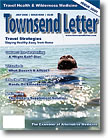


From the Townsend Letter |
||
Letter from the Publisher |
||
| It
didn't really hit me until the rabbi attached the black ribbon on
my shirt and then briskly tore it from the bottom into fragmented
halves. This ritual takes place privately before the Jewish funeral
service for the intimately bereaved. My brother and I had known
that this day would be coming, as my father had been gradually deteriorating
over the past many months. He had made little rallies along the
way – and like most medical victories that take place when
one is aged, there are not always logical reasons as to why such
things happen. Still, it had seemed very odd a few months back when
after he had lost the strength in his lower extremities to walk
down the hall to the bathroom, he regained overnight the power to
walk anew without the chair. He had been quite agitated the previous
night, so I gave him something to settle his nerves. Whether it
had been what I had given him or just being able to see me for the
first time in three months, he rallied. That was a happy memory
to take away.
Kerry Bone is a master herbalist who
has been writing for us for more than ten years. His review of herbal
experiments and literature has brought increasing respect to the
field of herbal science and its application in naturopathic medicine.
Unlike those who attempt to belittle herbal medicine by designing
simple experiments treating an herb as just another drug, Bone has
called for experiments that test herbs more broadly, considering
patient outcomes. Bone challenged the two-sentence conclusions that
reviewers made about herbs and often found data within the experiments
that supported and justified herbal use. His reports in the Townsend
Letter were clinically based.
In a column written August/September 1999, he developed a treatment
strategy for treating systemic lupus – a remarkable program
designing herbal combinations for supporting different aspects of
lupus.
This issue of the Townsend Letter takes up travel and outdoor medicine. A number of years back, we wanted to review a book by Kathleen Meyer called How to Shit in the Woods. That was the inspiration for this theme: Travel Health and Wilderness Medicine. In this issue, naturopathic physician Steve Morris offers a look at the diversity of botanical plants and medicine from the Amazon. Over the years, he has had the pleasure of leading a group of students, professional and non-professional, on a very reasonably priced trek in the central Amazon, extending between Brazil, Ecuador, and Peru. Morris believes that the experience of working with indigenous healers and seeing them use plants in their own setting for healing is a remarkable education for both doctors and lay persons. Morris has brought the use of indigenous botanicals back to his practice in Edmonds, Washington and has also taught about their application locally. This June, Steve Morris is once again leading a group into the tropics and invites interested readers to consider participation in the years ahead. Jonathan Collin, MD
|
||
![]()
Consult your doctor before using any of the treatments found within this site.
![]()
Subscriptions are available for Townsend Letter, the Examiner of Alternative Medicine magazine, which is published 10 times each year.
Search our pre-2001
archives for further information. Older issues of the printed magazine
are also indexed for your convenience.
1983-2001
indices ; recent indices
Once you find the magazines you'd like to order, please use our convenient form, e-mail subscriptions@townsendletter.com, or call 360.385.6021 (PST).
Who are we? | New
articles | Featured topics |
Tables of contents | Subscriptions | Contact
us | Links | Classifieds | Advertise | Alternative
Medicine Conference Calendar | Search site | Archives |
EDTA
Chelation Therapy | Home
© 1983-2008 Townsend Letter for
Doctors & Patients
All rights reserved.
Website by Sandy Hershelman
Designs
May 20, 2010
![]()

